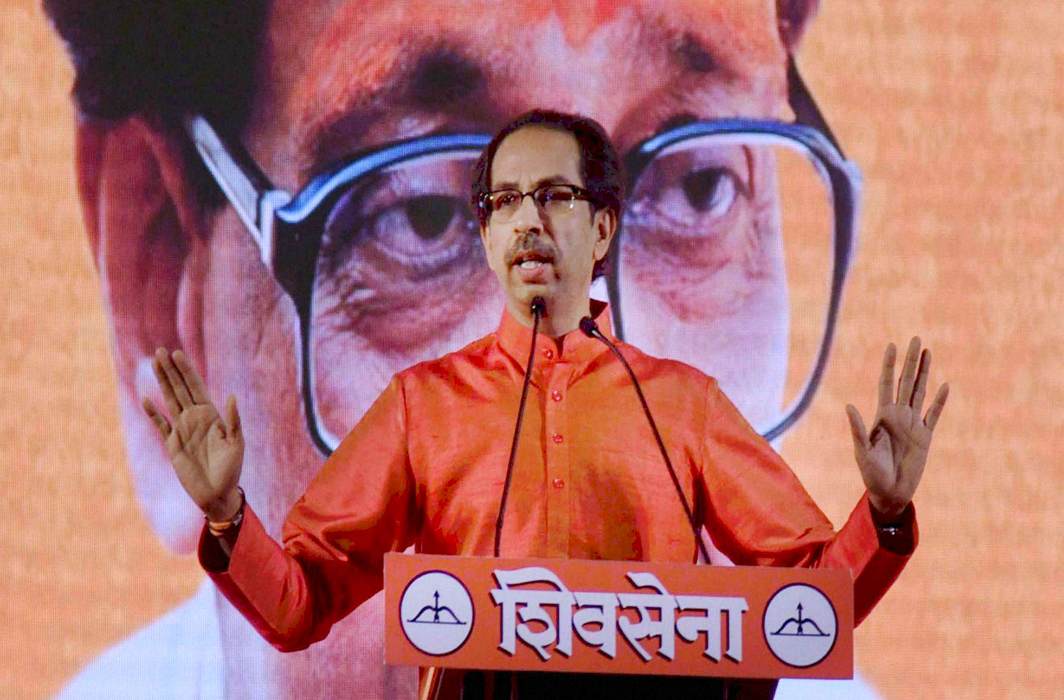[vc_row][vc_column][vc_column_text]Statement comes days after RSS chief Mohan Bhagwat claimed that Hindustan is a country of Hindus but belongs to others too if they adopt Indian culture
Days after Rashtriya Swayamsevak Sangh (RSS) chief Mohan Bhagwat reiterated his ‘Hindustan is for Hindus’ remark and asserted that “others” who adopt Indian culture are also welcome in the country, the Shiv Sena decided to qualify the Sangh chief’s remark, on Monday, by stating that Hindus have the first claim to India and “others” must be stacked lower in the pecking order.
“The RSS chief says like Hindus, India belongs to others as well. The Shiv Sena chief says India belongs to Hindus first and others later, because there are more than 50 countries for Muslims,” the Sena said in an editorial that appeared in the party mouthpiece ‘Saamana’.
RSS chief Mohan Bhagwat had, on Friday, said in Indore that ‘Hindustan’ is a country of Hindus, but it does not mean that it does not belong to “others”.
The Saamana editorial comes at a time when the alliance between the Shiv Sena and RSS progeny – the BJP – is on shaky ground with the leadership of both sides acknowledging, albeit unofficially, of an increasing trust deficit in the decades-old coalition.
In recent months, the Shiv Sena has become openly critical of the BJP and its leadership, particularly Prime Minister Narendra Modi. Sena chief Uddhav Thackeray and his close aide Sanjay Raut have openly hit out at Modi on key decisions taken by the central government – demonetisation and GST being just two of them – and talking of the Prime Minister’s waning popularity.
However, the Saamana editorial – seen in political circles as an official view of the Shiv Sena on critical issues – now seeks to hit out not just at the BJP but even the RSS and its chief, a move that can be perceived as the Maharashtra-based parties attempt at testing how far it can flex its muscles with the senior alliance partner.
Taking on Bhagwat, the Saamana editorial states: “Christians have countries like America and (in) Europe. Buddhists have China, Japan, Sri Lanka and Myanmar. Hindus do not have any country except this.”
The editorial also makes a point to criticise the Modi government over its attempts – or as the Sena thinks, the lack of them – to implement the communally divisive Hindutva agenda – an ideological thread that had brought the BJP and Shiv Sena together nearly three decades ago.
“Today there is a pro-Hindutva majority government in power. Yet, it is not willing to build a Ram temple in Ayodhya and has left its future in the hands of the court,” the Saamana editorial says, adding: “Despite a pro-Hindutva government, the ghar wapsi of Kashmiri Pandits hasn’t taken place.”
The construction of a Ram Temple at the site where the Babri Masjid stood in Ayodhya before its demolition by RSS-BJP workers in 1992 has been a common agenda of the BJP and Shiv Sena, much like the politically and communally sensitive issue of rehabilitating Kashmiri Pandits in the Kashmir valley.
Ever since the Modi government came to power in May 2014, the pro-Hindutva forces – BJP and Shiv Sena, among others – have revived the issue of construction of the Ram Mandir in Ayodhya. However, since the Babri Masjid-Ram Janmbhoomi title suit is pending before the Supreme Court (scheduled to be heard from December 5 onwards), the political claims of getting the temple built have been restricted to rhetoric and not actual implementation of the ground.
The Saamana editorial also touched upon another contentious issue – the ongoing debate over playing Vande Mataram and the national anthem in public places.
“A stubborn attitude prevails towards singing of ‘Vande Mataram’ despite the president and the prime minister belonging to the “thought process of the RSS”, and some also do not find it appropriate to stand up while the national anthem is being played,” the Sena editorial said.
“If these ‘others’ are insulting the national anthem by not standing up, the RSS chief should guide the pro-Hindutva government on what stand it should take against them,” the editorial said further.[/vc_column_text][/vc_column][/vc_row]


 India News5 hours ago
India News5 hours ago
 India News6 hours ago
India News6 hours ago
 LATEST SPORTS NEWS5 hours ago
LATEST SPORTS NEWS5 hours ago
 India News5 hours ago
India News5 hours ago













